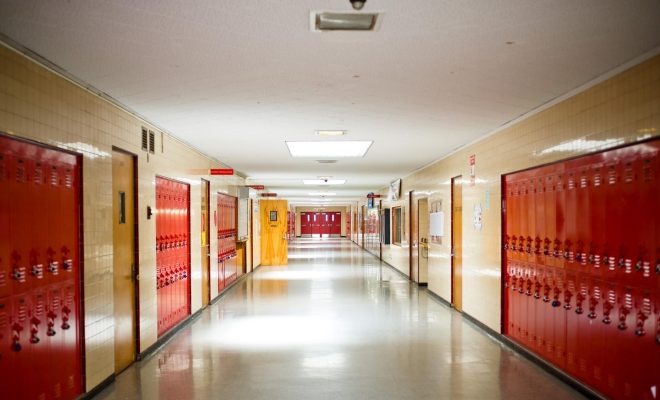Our Youth Are Under Attack

It is no secret that our Ummah is under constant, intense pressure, and from many quarters.
From the occupation of our lands, to the slaughter of our brothers and sisters, to the attacks on our Deen, to the universal problems people face all over the world in their daily lives such as inflation, unemployment, underemployement, it is as if we are climbing an endless, steep hill.
Although there is no shortage of problems, there is one big challenge that is easy to miss or neglect: the struggles of our youth.
The Dangers of Public Schools
The public school system throws two dangerous threats at our youth:
First, through the educational curriculum, which is designed to transform and assimilate kids into the Liberal Democratic system. In this process, our children are taught to ignore – if not hate – their Deen and think of taking freedoms as the reference point for all actions, i.e., to act upon their whims and desires.
Second, with the culture of the hallways, which basically forces the youth to put the ideas they are taught in the classrooms into real-world practice.
What do we mean?
Simply put, we are referring to the consumption of alcohol, drugs, and, in some cases, engaging in extra marital sexual activities such as zina (fornication).
To be clear, these were always problems in public schools, but that is the point: they have never gone away, and it is easy for parents and the community to forget or ignore them.
Unfortunately, we cannot assume that our children will be immune from these issues. Ultimately, our children spend the majority of their time either in the classroom, where they are taught to disobey Allah (SWT), or in the hallways (or with classmates in general), where they are pressured into acting on misguidance. Statistically, the odds are stacked against the obedience of Allah (SWT).
Granted, we might consider the risks of drugs or alcohol consumption or engaging in zina to be the most extreme, but the public school environments still nurture our children to think and act against the Deen.
Once our youth leave for university, these ideas will be cemented or crystalized and, as they join the workforce, they will be at high risk of either putting their Islam to the side or even gradually leaving it. But it would be foolish to underestimate the contribution of the ‘most extreme’ factors, like drugs, alcohol, or zina in the corruption of our youth.
In addition to these ‘old problems’, new problems are also taking root in public schools. Specifically, gambling is on the rise. With the legalization of online gambling and sports betting, and the availability of fewer career prospects, the youth – especially boys – are facing the pressure to partake as soon as they are legally able.
Gambling is extremely difficult to clearly pin down and address because the habits can form from an early age, and in subtle ways. For example, video games like Fortnite were accused of encouraging its players (mostly adolescents and teens) to pay real money for loot boxes, which randomize giving players different cosmetic features in the game. This mechanism drives the player to keep paying for loot boxes so that they can get the features (e.g., certain weapons, player ornaments) they really want, thus driving addiction as well.
One other challenge with gambling (and addiction, which fuels it) is that it is not confined to the school hallways. Much of the exposure happens online, so its impact is not limited to public schools, but can affect kids everywhere. Moreover, its early signs will not be obvious as the mentality for accepting it forms early, long before high school.
Islamic Schools Offer Shade, but Are not Enough
Naturally, the corrosive environment of the public school drives us parents to rely on Islamic schools.
Yes, Islamic schools offer an important service for shielding our children from the dangers discussed above, especially in the school hallways. Moreover, Islamic schools can, up to a point (but not entirely) protect the minds of our youth from the misguidance of the public school system.
However, Islamic schools are not enough on their own to properly protect the Deen in our youth. The problem, ultimately, is that we live in a Liberal Democratic society that actively works to misguide, transform, and assimilate us so that we become secular and non-practising.
So, in this context, an Islamic school can provide a bubble, but only a temporary and limited one. Eventually, kids will graduate and move on to university and work. They will – like all of us – face constant pressures to leave or sideline Islam at work or among friends.
Unless we proactively get involved in our children’s lives everyday, enrolling them in Islamic schools would, at best, delay the problem they will eventually face.
The Entire Muslim Community Must Get Involved
So, where does that leave us?
Well, it means that we – as parents, dawah groups, and the community as a whole – need to take a proactive role in the lives of our children and our youth.
This starts in the home by constantly engaging with our children, regardless of whether they go to public school, Islamic school, or are home schooled.
Whether it is in class, in the hallways, with their friends, or even online, our kids are being exposed to harmful ideas from all quarters. Yes, directly managing the exposure (by limiting ‘screen time’ or knowing who their friends are) can help, but again, it is just temporary. Eventually, our kids will leave the home and take up their own lives, on their own terms.
Thus, as parents, we need to engage our children in ways where we start understanding how they think, and, in turn, build trust and leverage discussions to guide their thinking towards Islam.
Once our youth become intellectually convinced of Islam, then, by the Permission of Allah (SWT), their chances of maintaining their Deen go up tremendously. Not only that, but they will, in sha Allah, pass on the Deen to their children and grandchildren.
Parents on their own cannot do this. There will always be a gap between us and our children, so getting older youth or young adults to step in as mentors for our children is also a must. Youth will relate to those who are closer in age, with experiences and awareness similar to theirs.
This is where the community, particularly masajid, must help. Youth-focused projects (i.e., managed by youth for the youth) need places to operate from – and the masajid must be the first option. Places like community centers are expensive, leaving very few accessible spaces. Encouraging youth-centric, youth-led programs in the masajid will help build a link between the youth and the masajid, while also turning the masajid into more active, focal points of the communities they serve.
Likewise, the masajid should make it a point to call upon older youth, especially those who grew up in Canada or studied here, to rise to the challenge of mentoring their younger brothers and sisters. Practical steps include, for example, calling for volunteers in youth focused programmes, offering spaces for networking, and, most importantly, maintaining constant communication with the youth on the issues that interest or affect them.
Ultimately, parents and the wider community must not take their eyes off the challenges the youth face in their own lives. Even when we think a problem is gone (e.g., alcohol consumption), it can and will return. This is the reality of living in a society that marginalizes the Deen by separating the creator from society, sanctifies freedoms, and pursues pleasure over the obedience to Allah (SWT).
May Allah (swt) protect our youth and guide us all. Ameen.








